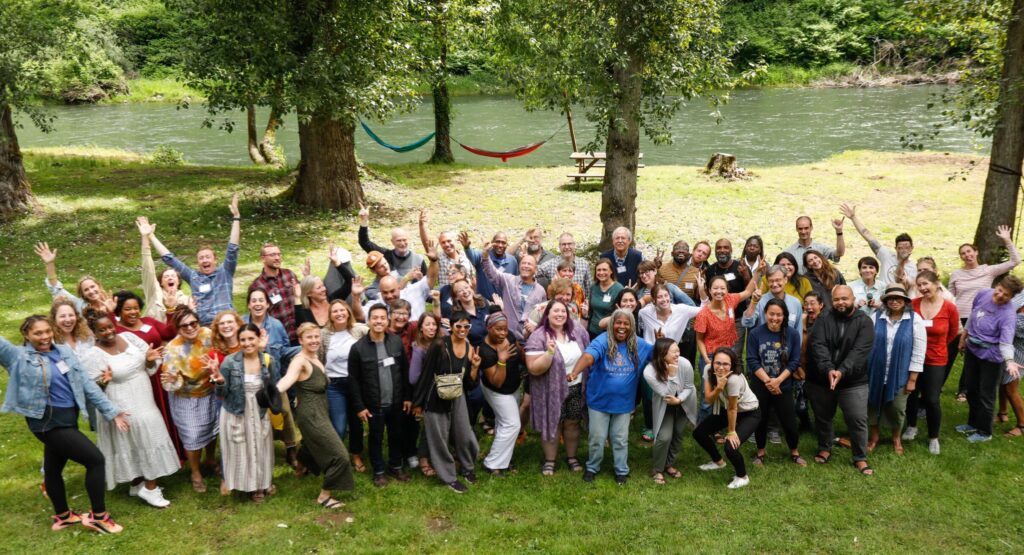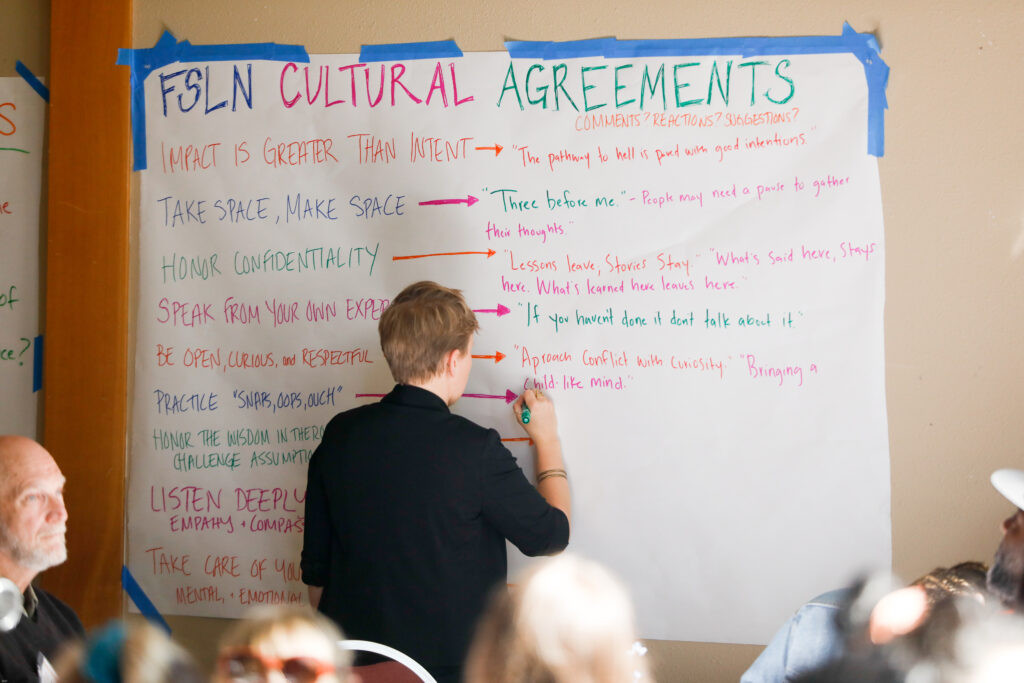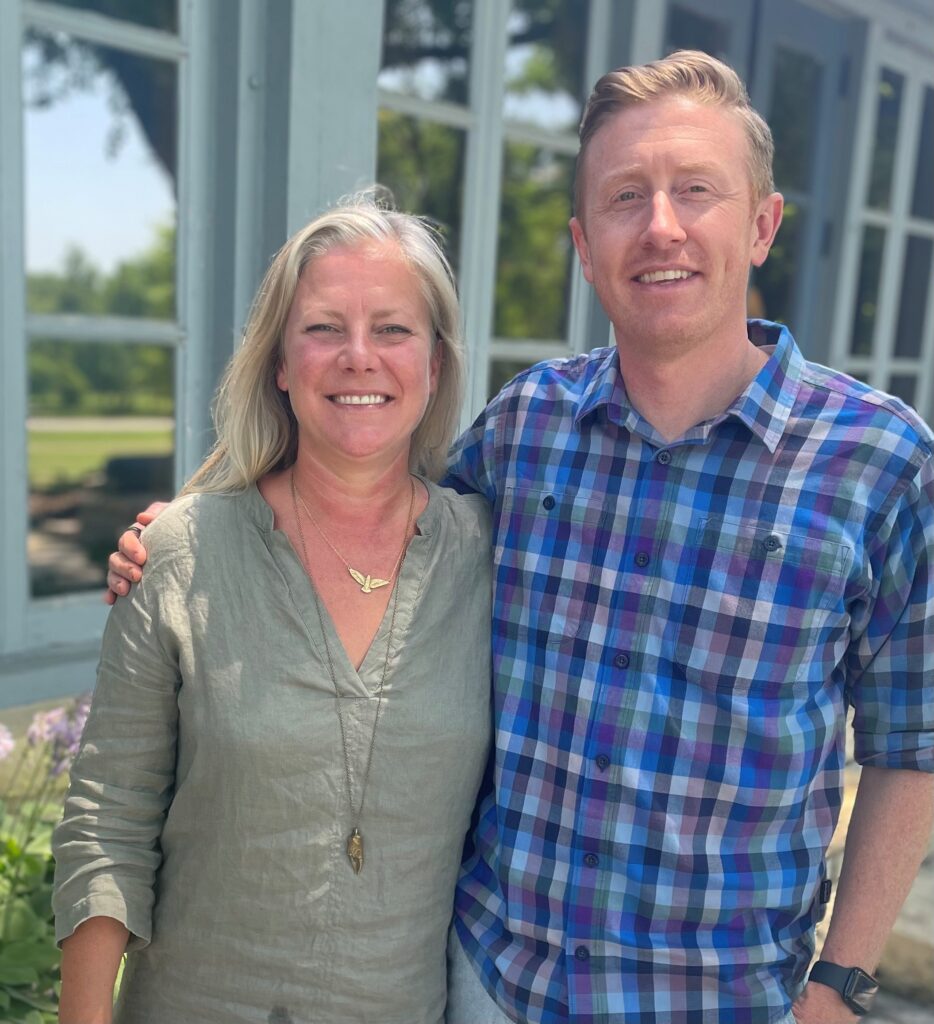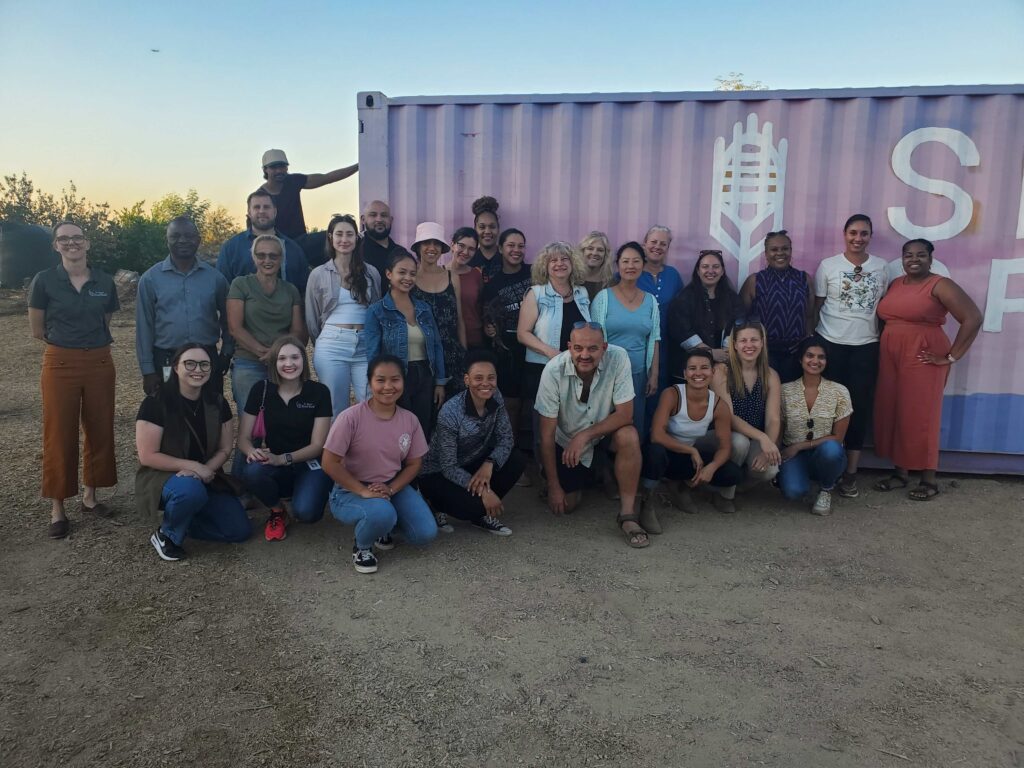
October 16, 2025 — After seven impactful years of rapid growth and national impact, Susan Lightfoot Schempf and the Food Systems Leadership Network (FSLN) have transitioned from the Wallace Center at Winrock International to its new home at Multiplier, a nonprofit accelerator that champions bold solutions to pressing social and environmental challenges. We sat down with Susan to ask her to share her proudest moments of her time leading the FSLN at the Wallace Center, and her hopes for the FSLN moving forward.

Food Systems Leadership Network
Vision and Strategy Gathering, 2022
When you think about your leadership of the Food Systems Leadership Network over the past seven years, what are you proudest of?
Unquestionably, the relationships and friendships that have been catalyzed through this network! At the end of the day, the quality of our lives and the quality of our work is directly related to the quality of our relationships, and the FSLN has been a mighty good matchmaker. I have personally met hundreds if not thousands of extraordinary food systems leaders from every corner of the country, and I’ve witnessed folks from very different backgrounds, worldviews, and communities forge lifelong friendships through this network.
This isn’t ‘networking’ in a transactional sense – these are relationships we can lean on, people we can call and ask for help, fellow travelers who remind you to give yourself a wink in the mirror every once in a while. I can’t even count the times people have shared with me how they met someone at an FSLN retreat, through the Community Food Systems Mentorship Program, or in a Community of Practice breakout group and then some kind of magic came of it. If there’s a legacy I leave when my days are done, may it be in the meaningful human connections that were made through the tables this network has set and the beauty, and dare I say love, that was created because of it.
What are your hopes for the FSLN as it transitions to its new home at Multiplier?
When the FSLN Evolution Team presented their recommendations to the Wallace Center last year, ultimately leading to our decision to spin off the network to a new organizational home, they laid out a captivating vision for the FSLN’s future that I frequently check back in with – to stay accountable to it, and be inspired and motivated by it. They envisioned the FSLN operating from a place of abundance, guided and supported by a Network Leadership Council with a clear governance structure and human-centered culture, and stewarded by a well-supported Network Backbone Team who are receiving administrative, financial, and human resources capacity that allows them to focus on programs, relationships, and outcomes.They also envisioned the FSLN further growing into a dynamic national hub for convening, skillbuilding, and resource sharing, and that by focusing on this unique role and purpose we will add great value to the broader movement for food systems transformation.
That’s my greatest hope in this transition – to realize this vision – and I am so excited to work with the team at Multiplier in the pursuit of it. Multiplier isn’t a typical fiscal sponsor – they are more like a backbone organization and accelerator that is deeply invested in the impact and success of their operating projects. From thought partnership on the FSLN’s emerging governance model to coaching on our fundraising strategy, the FSLN is already benefitting from their collaborative network of strategic advisors and wraparound operational support. I’m also really excited to meet the other projects with the Multiplier community, many of whom work in adjacent movements – I see a lot of opportunity for cross-pollination and partnerships in the years ahead.
You’ve worked at the Wallace Center at Winrock International for nearly nine years. Over that time, you’ve seen a lot of transitions within the organization. What are your hopes for the Wallace Center moving forward?
Just as each of us morph and change across the seasons and over time, so does an organization. The Wallace Center was born over 40 years ago, and it has grown and evolved over those four decades to meet the unique challenges and needs faced by the farmers, food systems leaders, and communities it serves. Its roots run deep – few people realize how the Wallace Center was instrumental in getting ‘sustainable agriculture’ onto the research agenda of land grant universities, how it contributed to the creation of the National Organic Program, how it supported the proliferation of farmers markets and food hubs and so much more.
I hope that the Center continues to stay in lockstep with the needs and opportunities of the moment – that it rides that cutting edge of innovation while remaining grounded in and accountable to the farmers, farm workers, food chain workers and food systems leaders just trying to do the simplest of things – feed each other and tend to the earth. I’m excited about the Wallace Center’s new Agriculture and Food Systems Strategy and the North Star this strategy sets for the organization, especially now as the shifting sociopolitical and financial landscape could easily sway organizations off course. I hope it is able to weather the inevitable storms ahead, anchor in its values, and keep its vision clear.


FSLN Cultural Agreements; Susan Lightfoot Schempf and Wallace Center Director Pete Huff
How do you envision the Food Systems Leadership Network and the Wallace Center continuing to work together to realize broader food systems change on the national level?
I’m hoping we can get into some good trouble together! The Wallace Center, by nature of being at Winrock International, has hefty institutional capacity and access to power- it can manage big national projects and initiatives with many different kinds of partners, including the private sector. The FSLN is emergent and responsive, and our new operating environment at Multiplier will enable us to move quickly and activate our broad and diverse network in advocacy and action. I think we can leverage those different but complementary strengths in ways that bring resources and attention to where they’re needed most. I also see some great opportunities to work together on participatory action research that could engage FSLN members – many of whom work on the frontline of food systems change – in identifying and defining the research inquiry with an eye for action, with Wallace Center working alongside those leaders to support data collection, analysis, and meaning-making. And I see opportunities for co-creating narratives that uplift community leadership and knowledge and using those narratives to shift how corporations, funders, and public agencies shape policy and programs. I’m excited about what we can do as partners, now that each organization can more fully focus on its core strengths and purpose.
Anything else to add?
We are living in extraordinary times and the food system sits at the intersection of so many crises facing our communities, our nation, and frankly the whole world. And yet, when I think about the brilliant people who make up the Food Systems Leadership Network, the Wallace Center, and the broader movement for food systems transformation in the United States and globally – the mentors and elders who have served this movement for decades, the up-and-coming youth with fire in their bellies, the farmer activists, the network weavers and the food pantry volunteers, the seed stewards and the food hub delivery truck drivers and the farmworker organizers and the academics and the policy wonks and, and, and – I feel a sense of hope.
Food systems leaders are superbly well positioned to be the most visionary, capable, and unifying leaders of our time – by the very nature of our work, we connect people to the earth, to rich histories and cultures, to our diverse foodways and to each other.
We find common ground and plant it with seeds of an irresistible vision for an equitable, sustainable, just and delicious future. My greatest hope is that the Food Systems Leadership Network elevates, accelerates, and knits together the kind of values-driven, heart-centered leadership that’s so desperately needed in our country. I look forward to working with the Wallace Center, Multiplier, other networks and coalitions and really anyone and everyone who shares that vision for transformative systems leadership! We’ve got our work cut out for us and to use a metaphor from my upbringing, we are walking through the valley, but I have deep faith in our collective potential to shift hearts and minds. It’s been an amazing few years of witnessing our potential come into fruition through the FSLN and I am excited to see where we go from here!

Members of the Farm to Food Assistance Learning Lab, Phoenix, 2023